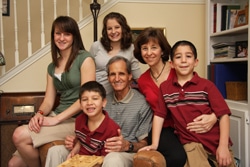By Jennifer Harris
Word&Way News Writer
Word&Way News Writer
While Scripture advocates taking care of orphans and widows, the church has abdicated that responsibility to the state, some Christian child-advocates insist.
 “It shortchanges people and the church,” said Robbi Haynes of marketing and recruitment for MBCH Children and Family Ministries, a corporation of the Missouri Baptist Children’s Home.
“It shortchanges people and the church,” said Robbi Haynes of marketing and recruitment for MBCH Children and Family Ministries, a corporation of the Missouri Baptist Children’s Home. With more than half a million children in the foster care system, according to the Adoption and Foster Care Analysis and Reporting System, the church has an opportunity and a responsibility to minister to children and their families, Haynes said.
The need is great, she emphasized. “There are never enough foster homes — ever.” Often, one foster parent will have around eight children, because the system is desperate, she said. Many foster families get overloaded and quit completely.
“Many are willing, but they don’t know about the opportunity,” Haynes said. And the church can help with that.
“The church needs to have at the forefront that foster care is a ministry,” she said. “Missions doesn’t have to be on the other side of the world. It can be down the hall — in a bedroom at your house.”
John Marshall, pastor of Second Baptist Church in Springfield, Mo., regularly addresses the need for foster parents from the pulpit.
“People are allowed to indicate on their information cards if they would like to be contacted by MBCH to find out more about it,” Haynes said.
“Also, they have volunteers in the church who encourage and support foster parents by prayer and encouragement, child care, camp scholarships, help with birthday and Christmas, etc.”
The cost to a church wanting to be involved is minimal, she said. Training and licensing are available at no cost. Churches only need to provide space and publicity. “The cost is in annoyance,” she said. “These are not easy kids, but they need a church family, and the church will benefit.”
Studies have found that families who have a connection with a church do a better job at fostering than those not in church, Haynes noted.
Churches can assist foster families in a variety of ways. Simply be an encourager to a family and give them a pat on the back, Haynes suggested. Provide childcare or respite care. Involved individuals will need to go through background checks, but the process isn’t difficult, she said.
Churches can help with financial obligations such as school supplies, class rings, prom dresses, sports uniforms and summer camps. “Foster parents are reimbursed, they are not paid,” Haynes said. “Most don’t break even.”
Churches also can present a welcoming environment for foster children. “Most have never been in church,” Haynes said. “They have no training in how to behave.”
It’s important for the church to let foster parents know they are on the same team — not an “Oh, there they are again,” mentality, she said.
Churches can provide space for foster parent training by letting organizations that place foster children know the church is available.
Other ideas include organizing a support group for parents or hosting the county appreciation dinner for foster families. “Most counties have a dinner and need to find a place,” Haynes said.
“Foster care is not glamorous,” she said. “It’s not like getting to jet off to India. It’s just hard work, but it’s worth it. I think it’s what Jesus would want us to do.”
Above: Mark and Jacquie of Rowlett, Texas, fostered children for years before adopting brothers Nathan and William, who were both placed with their family shortly after they were born. "Fostering has really knitted our family together," said Jacquie Craggett of the experience. They have four older daughters as well.






